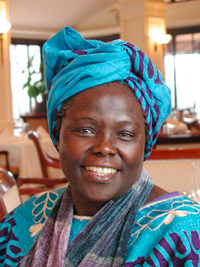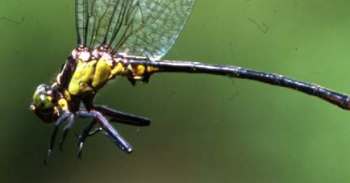Kenyan environmentalist and Nobel laureate Wangari Maathai died Sunday after a battle with ovarian cancer. She was 71.
 Wangari Maathai. Courtesy of the Green Belt Movement |
Maathai is best known for founding the Green Belt Movement in Kenya in 1977. The initiative empowered rural women by getting them engaged in management and protection of forests. Over the past three decades, the Green Belt Movement has planted tens of millions of trees across Kenya and trained thousands of women in agroforestry, bee-keeping, and other sustainable livelihoods.
For her efforts, in 2004 Maathai became the first African woman to win the Nobel Peace Prize. The award further boosted her status as one of the most prominent voices in the increasingly global movement to involve local communities in the management and conservation of forests.
Rising from humble roots, Maathai was a hero to many.
“She was a true African heroine,” said Archbishop Desmond Tutu, who called her a “leading voice on the continent.”
“She understood and acted on the inextricable links between poverty, rights and environmental sustainability One can but marvel at her foresight and the scope of her success.”
Tanzania’s President Jakaya Kikwete praised Maathai via a post on Twitter.
“Rest in peace Dr Wangari Maathai,” he wrote. “A great woman, an inspiration for many women across Africa, a magnificent visionary and embodiment of courage.”
Maathai’s Green Belt Movement said that while it deeply mourns her death, the world is a better place for her efforts.
 Maathai’s Longleg, a dragonfly named in honor of Maathai. Photo by Viola Clausnitzer. |
“Professor Maathai’s departure is untimely and a very great loss to all who knew her—as a mother, relative, co-worker, colleague, role model, and heroine; or who admired her determination to make the world a more peaceful, healthier, and better place,” the organization said on its web site.
Maathai leaves behind three children—Waweru, Wanjira, and Muta—and a granddaughter, Ruth Wangari.
Related articles
Forgotten species: discovering the shimmer of Maathai’s Longleg
(January 13, 2010) Few species receive less respect and less conservation attention than insects. This despite the fact that they are some of the most diverse species on the planet and they provide a number of essential services to humankind, including pollination, pest control, production (for example honey and silk), waster recycling, and indications of habitat health. Scientists are not only unsure just how many species of insects are threatened in world; they are equally uncertain how many insects exist. Currently there are nearly a million insect species described by science, but millions more likely exist. It’s probable that innumerable insect species have vanished before even being catalogued by entomologists. Fortunately, the beautiful emerald dragonfly Maathai’s Longleg Notogomphus maathaiae avoided this fate. Discovered only in 2000 in the forested mountains of Kenya, the dragonfly is named after Nobel Prize winner Wangari Maathai.
Nobel Prize winner, anti-poverty group, scientists fire back at logging lobbyist
(November 01, 2010)